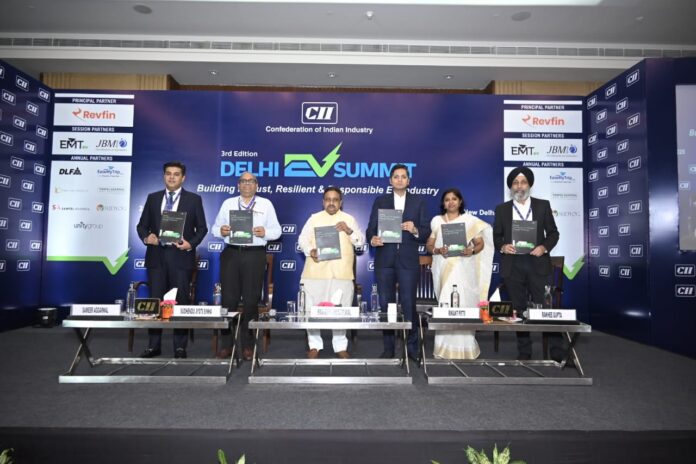New Delhi, August 21, 2025 – With India targeting net-zero emissions by 2070, the transition to clean mobility took center stage at the 3rd edition of the CII Delhi EV Summit, organized under the theme “Building Robust, Resilient and Responsible EV Industry.” The event brought together over 170 key stakeholders from government, industry, finance, and technology to deliberate on the roadmap for a sustainable and inclusive electric vehicle (EV) ecosystem.
Net-Zero by 2070: EVs Key to India’s Clean Mobility Vision
Speaking at the summit, Shri Harsh Malhotra, Hon’ble Minister of State, Ministry of Road Transport & Highways, Government of India, emphasized that while net-zero by 2070 may seem distant, it is achievable—but only through decisive action towards non-fossil fuel mobility. He identified electric vehicles, sustainable manufacturing, and responsible battery recycling as the core pillars of this transition.
The Minister underlined the importance of Production Linked Incentive (PLI) schemes and the expansion of EV charging infrastructure as essential drivers of this transformation. Applauding Delhi’s leadership in EV adoption and its expanding electric public transport fleet, he called for greater government-industry collaboration, adoption of global R&D best practices, and strategies to position India as a global leader in EV manufacturing and innovation.
Financing the Future: Unlocking Access to EVs
Shri Praveen Khandelwal, Hon’ble Member of Parliament, addressed a critical bottleneck in EV adoption: affordable financing. He stressed that achieving widespread EV usage, especially for small businesses and last-mile users, requires closer cooperation between policymakers, industry, and trade associations.
He also released a landmark report, “Driving Commercial EV Adoption through Financing”, which offers actionable recommendations to unlock credit access and financial support for commercial EV operators across India.
Delhi: India’s EV Policy Powerhouse
Highlighting the national capital’s proactive stance, Shri Sudhendu Jyoti Sinha, Advisor, Infrastructure Connectivity & Electric Mobility, NITI Aayog, stated that Delhi is set to become one of the most EV-ready and liveable cities globally. He previewed the upcoming Delhi EV Policy 2.0, which aims to be the most progressive and fast-acting EV policy in India—further cementing Delhi’s status as both an EV adoption and manufacturing hub.
Industry Leaders Applaud Policy, Push for Infrastructure and Innovation
Representing industry perspectives, Mr. Rikant Pitti, Chairman, CII Delhi State and Co-Founder & CEO, EaseMyTrip.com, praised Delhi’s ambitious EV policy goals, including a 95% EV share in new vehicle registrations by 2027. He noted the creation of over 20,000 green jobs through EV charging infrastructure and emphasized the need to bridge financing gaps, strengthen recycling systems, and expand the charging network.
Mr. Sameer Aggarwal, Chairman, CII Delhi Panel on Liveability and Founder & CEO, Revfin, projected that India’s EV market is on track to cross USD 100 billion within the next 4–5 years, with Delhi already leading with 18% of new vehicle registrations being electric. He stressed the importance of robust charging corridors, resilient manufacturing practices, and equitable EV access to sustain this growth.
Mr. Aggarwal also unveiled the “Driving Commercial EV Adoption through Financing” report, developed in partnership with Revfin, Green Frontier Capital, and Redseer as the knowledge partner. The report offers deep insights and strategic recommendations to empower manufacturers, financiers, and policymakers in driving large-scale EV adoption.
Charting the Way Forward
The summit served as a vibrant platform to exchange ideas and strategies around key enablers of EV growth—charging infrastructure, innovative financing models, manufacturing opportunities, policy interventions, and sustainable adoption pathways.
With participation from senior government officials, industry pioneers, tech innovators, and financial institutions, the discussions underscored Delhi’s ambition to emerge as India’s EV hub, setting the pace for a cleaner, greener, and more connected urban future.

